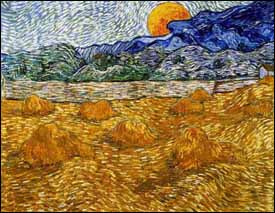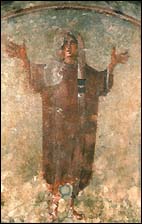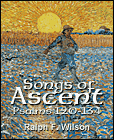
|
Old Testament
New Testament
Gospels
Acts
Paul's Letters
General Letters
Revelation
Topical Studies
Beginning the Journey (for new Christians). en Español

|
Old Testament
New Testament
Gospels
Acts
Paul's Letters
General Letters
Revelation
Topical Studies

|
Home
Bible Studies
Articles
Books
Podcasts
Search
Menu
Donate
About Us
Contact Us
FAQ
Sitemap
15. Psalm 134. Come, Bless the Lord
 Vincent Van Gogh, ' Landscape with Wheat Sheaves and Rising Moon' (1889), oil on canvas, 28 x 36 in, Kröller-Müller Museum, Otterlo, Netherlands. |
Psalm 134 is the final song in the series of Songs of Ascent, a hymn of praise. I imagine it this way. The pilgrims on their way to the Holy City envision the last day, their last night, ready to leave in the morning. It is a final time to offer blessings to God in the temple before returning home.
"A Song of Ascents.
1 Come, bless the LORD,
all you servants of the LORD,
who stand by night in the house of the LORD!
2 Lift up your hands to the holy place
and bless the LORD!
3 May the LORD bless you from Zion,
he who made heaven and earth!" (Psalm 134:1-3, ESV)
For me, this psalm has special emotional content, since, for the past five decades I have sung it as a praise chorus and led others in singing it before the Lord.186 I've lifted my hands before the Lord as I've sung, and, while leading on the guitar, I would lift the guitar up as a way of blessing God. My soul loves this psalm, since it expresses for me my love of blessing God.
It's a simple psalm. Let's ponder it briefly.
Blessing the Yahweh in his House (Psalm 134:1)
"Come, bless the LORD,
all you servants of the LORD,
who stand by night in the house of the LORD!" (Psalm 134:1)
It begins with an interjection. "Come" (ESV, NRSV, NIV), "behold" (KJV) is used here in Hebrew to add emphasis to the following word, a command: "bless"!187 So the psalmist is saying: Don't miss this! Bless Yahweh! Offer praises to the Lord!
The recipients of this command to bless are "servants of Yahweh," in particular, those who are on night-duty in the temple, "the house of the Lord." For hundreds of years, a cadre of priests and Levites would be assigned to remain in the temple all night, to keep the lampstand lit, to keep the sacrifices burning, and to guard the gates (Exodus 27:21; Leviticus 6:9; 1 Chronicles 9:22-27).188 Their duties also included audible worship.
"And they were to stand every morning,
thanking and praising the LORD,
and likewise at evening." (1 Chronicles 23:30)
Sometimes, we "professional Christians" (pastors, worship leaders, organists, deacons, etc.) need a special exhortation to worship. We go through the motions of our jobs as we've done for years, often without much thought. Trimming the wicks of the 7-branched lampstand and tending the burning sacrifices gets to be routine. And we forget to do the most important thing: to stand before Yahweh and bless him, hands raised, hearts lifted up with our hands! (Lamentations 3:41).
So the exhortation begins with "Come!" or "Behold!" or "Listen up!" you servants who are on duty. Bless the Lord with your whole heart, soul, mind, and strength, and count it a deep privilege to be trusted with the holy things of God.
To Bless (bārak)
The key word in this short psalm, found once in each of its three verses, is "bless" (ESV, NRSV, KJV), "praise" (NIV). The Hebrew word is bārak, which, incidentally, is the given name of America's 44th President. It is a wonderful name if one uses it as a reminder to bless. When one greater blesses a person of lower status, it means "to endue with power for success, prosperity, fecundity, longevity, etc."189 When the lesser blesses the greater, that is, God, the word means "to declare God the origin of power for success, prosperity, fertility," that is, to "praise God."190 In this sense it appears often in the Psalms. Our passage uses it both ways: to bless God in verses 1 and 2; for God to bless his people in verse 3.
The idea of blessing has a long and rich tradition in the Old Testament. The blessings of God begin in Genesis 1, where God blesses the animals, and then man, saying, "Be fruitful and increase in number; fill the earth and subdue it..." (Genesis 1:28).
Indeed, blessing is the basis of the Abrahamic Covenant.
"And I will make of you a great nation,
and I will bless you and make your name great,
so that you will be a blessing.
I will bless those who bless you,
and him who dishonors you I will curse,
and in you all the families of the earth shall be blessed." (Genesis 12:2-3)
The Davidic Covenant (that we discussed on Day 13 in Psalm 132) is also based on a blessing, a promise to David that his descendants, his dynasty will sit on the throne forever. When they sin, they will be disciplined, "but my steadfast love will not depart from him" (2 Samuel 7:15). The final Son of David is Jesus the Messiah, who inherits the blessings of the Kingdom of God.
When we love God, we reciprocate his blessing and echo it back to him in praise.
"Bless the LORD, O my soul,
and all that is within me,
bless his holy name!
Bless the LORD, O my soul,
and forget not all his benefits." (Psalm 103:1-2)
Lift Up Your Hands and Bless the Lord (Psalm 134:2)
Blessing is often used in the Bible in connection with the hands.
"Lift up your hands to the holy place191
and bless the LORD!" (Psalm 134:2)
Abraham, Jacob, and Jesus lay on hands to bless children. Both Aaron (Leviticus 9:22) and Jesus (Luke 24:50) lift up their hands over the people in blessing and benediction (from a Latin word, benedictus, which means "blessing").
 Orante figure from the Catacomb of Priscilla, Cubicle of the Velata, Rome (second half of the third century). This pose of arms lifted in prayer is found in thousands of figures in the catacombs, representing a soul at peace in paradise. |
Indeed, praying with lifted hands was the common position of prayer for the Israelites, because they were blessing God himself with their hands, hearts, and voices.192 The early Christians also followed this practice. Paul writes,
"I desire that in every place the men should pray,
lifting holy hands without anger or quarreling." (1 Timothy 2:8)
The practice continued on in the early church. One of the characteristic images found in the Christian catacombs in Rome is the orante, a Christian believer lifting hands in prayer and praise.193
Receiving Yahweh's Blessing from Zion (Psalm 134:3)
The short psalm concludes with a call for Yahweh's blessing.
"May the LORD bless you from Zion,
he who made heaven and earth!" (Psalm 134:3)
The Songs of Ascent that began with songs of the pilgrims climbing the hills to celebrate a festival of Yahweh in Jerusalem, now call for Yahweh's blessing from Zion, his earthly capital. We're reminded that this is no normal blessing or good wishes. It is the Blessing of the One who made heaven and earth. And so we can rejoice at our great fortune!
"If God is for us, who can be against us?" (Romans 8:31)
I encourage you, my friend, to practice the command of this psalm with your own arms, your own hands. Even if lifting hands in worship isn't your tradition, try it! Like the posture of kneeling, the posture of lifted hands helps your whole body participate in praise to the one who loves you and gave his life that you might have eternal life.
You may remember the story of Balaam the prophet who is hired by Israel's enemies to curse them. But Balaam, at God's command blesses them instead. His employer is angry when he hears of it and tells Balaam to cancel his blessing on Israel, but Balaam replies,
"Behold, I received a command to bless:
he has blessed, and I cannot revoke it." (Numbers 23:20)
No matter what others intend to frustrate us, to hurt us, to destroy us, to discourage us, it is God's blessing that will stand, his word of grace that will win out. When all is said and done, when civilizations have risen and fallen and Christ returns, it is his blessing -- and only his blessing -- that matters.
My prayer for you, as we conclude this series of devotions on the Songs of Ascent, is that you may receive the blessing of Yahweh, Maker of heaven and earth, and then reflect that blessing back to him in praise. Lift up your hands to heaven, to God's "holy place," and bless the Lord!
Prayer
 Available in paperback, PDF, and Kindle formats. |
Father, thank you for this chance to study the Songs of Ascent with my brothers and sisters. Teach me to love you more. Teach me how to praise you with my whole heart, not just with my lips. Don't let my reluctance to lift my hands to you reflect a heart that is growing dull towards you. But stir me that I might bless You, O Lover of my soul. In Jesus' name, I pray. Amen.
Meditation
Day 15 Meditation (Psalm 134). What does it mean to you to bless or to praise the Lord? Do you take time in your daily devotions to bless him, to praise him? What does it mean to you to receive a blessing from the One who made heaven and earth? https://www.joyfulheart.com/forums/topic/1914-15-bless/
Endnotes
[186] "Behold, Bless Ye the Lord," by Bob Probert (Maranatha! Music, 1979; can be sung as a round); and "Come, Bless the Lord, All Ye Servants of the Lord," author unknown, appears in The Singing Word (YWAM, 1974) and Scripture in Song -- Book 1: Songs of Praise (Scripture in Song, 1976). It can be sung with an echo.
[187] Hinnēh, "behold, lo, see" An interjection demanding attention -- "look, see" -- occurring over a thousand times. It emphasizes the immediacy, the here-and-now-ness, of the situation (Carl Philip Weber, TWOT #510) "Behold!" -- emphasizes the following word (Holladay, p. 82, 1).
[188] Longman (Psalms, p. 441) cites J. W. Hilber, "Psalms," in Zondervan Illustrated Bible Backgrounds Commentary (Zondervan, 2009), vol. 5, p. 430. DeClassé-Walford (Psalms NICOT, p. 940) sees the "servants of the Lord" as referring to "the whole community of ancient Israel," but I don't see this in the text.
[189] "Bless" (ESV, NRSV, KJV), "praise" (NIV) is the Piel imperative of bārak (John N. Oswalt, TWOT #285).
[190] Bārak, Holladay, pp. 49-50.
[191] "Holy place" is qōdesh, "apartness, holiness, sacredness, hallowed, holy." The noun qōdesh connotes the concept of "holiness," i.e. the essential nature of that which belongs to the sphere of the sacred and which is thus distinct from the common or profane. That which was dedicated to God was conceived of as entering the sphere of the "holy" (Thomas E. McComiskey, TWOT #1990a).
[192] For more on this, see my article, "Lifting Hands in Worship," Paraclete, Winter 1986, pp. 4-8. www.joyfulheart.com/scholar/hands.htm
[193] More examples can be seen on my webpage, "Orante (Orans) as Early Christian Symbol." www.jesuswalk.com/christian-symbols/orante.htm
Copyright © 2026, Ralph F. Wilson. <pastor![]() joyfulheart.com> All rights reserved. A single copy of this article is free. Do not put this on a website. See legal, copyright, and reprint information.
joyfulheart.com> All rights reserved. A single copy of this article is free. Do not put this on a website. See legal, copyright, and reprint information.


 To be notified about future articles, stories, and Bible studies, why don't you subscribe to our free newsletter, The Joyful Heart, by placing your e-mail address in the box below. We respect your
To be notified about future articles, stories, and Bible studies, why don't you subscribe to our free newsletter, The Joyful Heart, by placing your e-mail address in the box below. We respect your